| کد مقاله | کد نشریه | سال انتشار | مقاله انگلیسی | نسخه تمام متن |
|---|---|---|---|---|
| 329566 | 1433674 | 2006 | 9 صفحه PDF | دانلود رایگان |

Clinical and epidemiological studies have found that type 2 diabetes, and hyperinsulinaemia, increased the risk of developing Alzheimer's disease (AD) in the elderly. The link between hyperinsulinaemia and AD may be insulin-degrading enzyme (IDE). This enzyme degrades both insulin and amylin, peptides related to the pathology of type 2 diabetes, along with amyloid-β peptide (Aβ), a short peptide found in excess in the AD brain. We review the current evidence, which suggests that hyperinsulinaemia may elevate Aβ through insulin's competition with Aβ for IDE. Genetic studies have also shown that IDE gene variations are associated with the clinical symptoms of AD as well as the risk of type 2 diabetes. The deficiency of IDE can be caused by genetic variation or by the diversion of IDE from the metabolism of Aβ to the metabolism of insulin. It is intriguing to notice that both hyperinsulinaemia and IDE gene variations are related to the risk of AD when the Apolipoprotein E4 (ApoE4) allele, the major risk factor of late-onset AD, is not present. Further studies of the role of IDE in the pathogenesis of AD, which may uncover potential treatment target, are much needed.
Journal: Neurobiology of Aging - Volume 27, Issue 2, February 2006, Pages 190–198